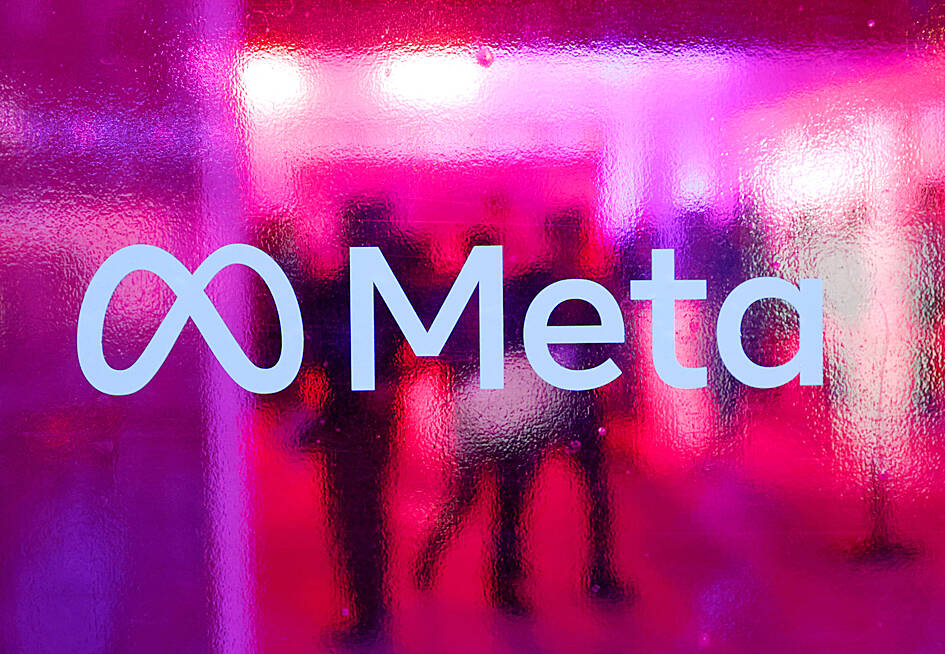Meta Platforms on Friday denied that it had assisted China in suppressing political speech by Taiwanese Facebook users, a week after a Democratic Progressive Party lawmaker urged the government to address the issue.
The controversy stems from testimony delivered on April 9 to the US Senate by former Meta executive Sarah Wynn-Williams, who said that Meta chief executive officer Mark Zuckerberg developed censorship tools to aid Beijing in exchange for access to the Chinese market.
The tools included a system deployed in Hong Kong and Taiwan that automatically flagged posts with more than 10,000 views for review by a “chief editor,” Wynn-Williams said.

Photo: REUTERS
The system was designed in close collaboration with Chinese Communist Party officials, who tested the tools and provided feedback to enhance their ability to target specific content and imagery, she added.
Meta Asia-Pacific public policy vice president Simon Milner on Friday told Taiwan-based journalists in a video conference that the accusations were false and unfounded, as Facebook does not operate in China.
Facebook has never censored content from Taiwanese users at the request of the Chinese government, or shared their personal data with the Chinese government, he said, adding that the allegations stem from a former employee who was dismissed eight years ago due to poor performance.
Meta’s content moderation system is based on guidelines developed in collaboration with experts in technology, public safety and human rights, Milner said.
The mechanism targets posts that receive a high volume of user reports in accordance with the guidelines, he said.
The company continuously changes community guidelines to reflect changes in social norms, language and public opinion, he added.
Separately, Meta’s Taiwan branch wrote on Facebook that it “solemnly denies” allegations that the company colluded with Beijing to suppress free speech in Taiwan.
Meta did not allow Beijing to censor content from Taiwanese users, share their personal information with Chinese officials or establish any content moderation team in China, it said.

The manufacture of the remaining 28 M1A2T Abrams tanks Taiwan purchased from the US has recently been completed, and they are expected to be delivered within the next one to two months, a source said yesterday. The Ministry of National Defense is arranging cargo ships to transport the tanks to Taiwan as soon as possible, said the source, who is familiar with the matter. The estimated arrival time ranges from late this month to early next month, the source said. The 28 Abrams tanks make up the third and final batch of a total of 108 tanks, valued at about NT$40.5 billion

Two Taiwanese prosecutors were questioned by Chinese security personnel at their hotel during a trip to China’s Henan Province this month, the Mainland Affairs Council (MAC) said yesterday. The officers had personal information on the prosecutors, including “when they were assigned to their posts, their work locations and job titles,” MAC Deputy Minister and spokesman Liang Wen-chieh (梁文傑) said. On top of asking about their agencies and positions, the officers also questioned the prosecutors about the Cross-Strait Joint Crime-Fighting and Judicial Mutual Assistance Agreement, a pact that serves as the framework for Taiwan-China cooperation on combating crime and providing judicial assistance, Liang

A group from the Taiwanese Designers in Australia association yesterday represented Taiwan at the Midsumma Pride March in Melbourne. The march, held in the St. Kilda suburb, is the city’s largest LGBTQIA+ parade and the flagship event of the annual Midsumma Festival. It attracted more than 45,000 spectators who supported the 400 groups and 10,000 marchers that participated this year, the association said. Taiwanese Designers said they organized a team to march for Taiwan this year, joining politicians, government agencies, professionals and community organizations in showing support for LGBTQIA+ people and diverse communities. As the first country in Asia to legalize same-sex

MOTIVES QUESTIONED The PLA considers Xi’s policies toward Taiwan to be driven by personal considerations rather than military assessment, the Epoch Times reports Chinese President Xi Jinping’s (習近平) latest purge of the Chinese People’s Liberation Army (PLA) leadership might have been prompted by the military’s opposition to plans of invading Taiwan, the Epoch Times said. The Chinese military opposes waging war against Taiwan by a large consensus, putting it at odds with Xi’s vision, the Falun Gong-affiliated daily said in a report on Thursday, citing anonymous sources with insight into the PLA’s inner workings. The opposition is not the opinion of a few generals, but a widely shared view among the PLA cadre, the Epoch Times cited them as saying. “Chinese forces know full well that